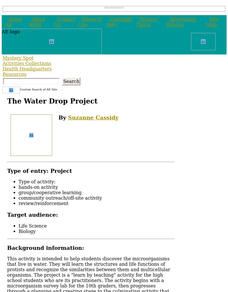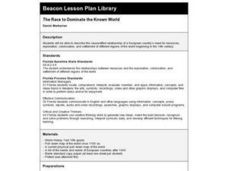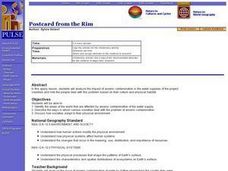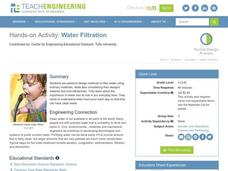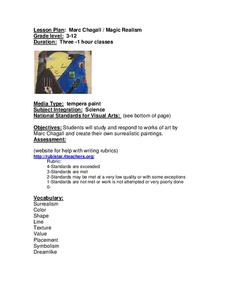Curated OER
The Water Drop Project
Students discover the microorganisms that live in water. They study the structures and life functions of protists and recognize the similarities between them and multicellular organisms.
Curated OER
The Race to Dominate the Known World
Students describe cause/effect relationship of a European country's need for resources, exploration, colonization, and settlement of different regions of the world beginning in the 14th Century, and role play representatives of assigned...
Kate Stickley
Reading the World: Latitude and Longitude Lesson latitude and longitude, maps, coordinates on a map, prime meridian, reading maps, equator, globes
Find five activities all about longitude and latitude! Use oranges to show the equator and prime meridian, plot birthdays on a map using coordinates, and plan a dream vacation.
Curated OER
Water Use and Conservation
Students discuss the different types of water found on Earth. They discover why not all water is used for drinking and calculate how much water they use. They create their own water conservation plan.
Curated OER
Water Quality
Students investigate the water cycle and evaporation. They study the porosity and permeability of groundwater, and the capillary action in soil in this unit.
Curated OER
You Can Change the World
Students discuss ways they can help protect the environment. In groups, they examine various types of animals and identify their characteristics, food and habitats are compared. They create a Hyperstudio presentation in which they scan...
Curated OER
Water Use Around the World
Students compare their water use with other places around the world. They calculate the amount of water they use in a week and discuss how to conserve water. They discover the amount of clean water throughout the world.
Curated OER
Where Has All the Water Gone?
Students identify how we use water everyday. They determine the amount of water used in different activities. They finally explain why the water supply is limited and how we can conserve water.
Curated OER
Water Mitigation
Young scholars identify the major health effects of arsenic contamination. They explain how arsenic gets into groundwater in Bangladesh. Students list ways to prevent arsenic from getting into drinking water. They explain why access to...
Curated OER
World Geography: Postcard from the Rim
Students are able to identify the areas of the world that are affected by arsenic contamination of the water supply. They are able to describe the ways in which various societies deal with the problem of arsenic contamination. ...
Curated OER
Water Filtration
Pupils work together to examine the role of water in their lives. They discover the process to clean water so it is clean for one to drink. They explore the role of environmental engineers and their problem of getting clean water to...
Curated OER
The Water in Our Lives: Be the Bug
Students examine a local water supply and create a fictional invertebrate specifically adapted to thrive in that environment. They write a short story from the invertebrate's point of view.
Curated OER
Earth Day
In this environment worksheet, students read the passage about Earth Day and then take the multiple choice test with the four questions .
Curated OER
Parched! No Water, No Town
Students discuss the benefits of water conservation. Given a data sheet, they document their water usage over a specified period. Water usage data is graphed and analyzed. Students discuss ways in which they can conserve water.
Polar Trec
Plankton Parents
Plankton are so abundant in the ocean they outweigh all of the animals in the sea. In this three day activity, groups discuss and become familiar with plankton, capture females, and look for egg production on day three.
Baylor College
Needs of Plants
What better way to learn about plant life than by creating a class garden? Young botanists start with a brief discussion about radishes before planting seeds and watching them grow. To determine the importance of water, sunlight, and...
Duluth-Superior Area Educational Television Corporation
Marc Chagall / Magic Realism
Surrealistic painters like Marc Chagall and Wendy Rouse show viewers an expansive world in a small area. Young artists have a opportunity to create their own surrealistic paintings in response to a study of works by Chagall and Rouse.
Chicago Botanic Garden
Are Global CO2 Levels Changing?
According to the Mauna Loa observatory, carbon dioxide levels increased by 3 ppm in our atmosphere between 2015–2016. Individuals analyze carbon dioxide data from around the world and then share this with a home group in lesson three of...
NOAA
Climate, Weather…What’s the Difference?: Make an Electronic Temperature Sensor
What's the best way to record temperature over a long period of time? Scholars learn about collection of weather and temperature data by building thermistors in the fourth installment of the 10-part Discover Your Changing World series....
Royal Society of Chemistry
Chemistry Masterclass—Chemistry Outreach
Immerse your chemistry class in the world of organic chemistry! Science scholars isolate acetaminophen from an over-the-counter sample during an intense and interesting lab. Groups use many different separation and analysis techniques to...
101 Questions
Brita
It's hard to envision what 39 billion plastic bottles look like. Brita claims that the US uses that number of plastic bottles each year! If that's not enough to get your attention, figure out how many times 39 billion water bottles can...
PricewaterhouseCoopers
Waste and Recycling: Recycling Paper
We take paper for granted, while thousands of trees are being made into the paper we toss in the trash. Start a dialogue about paper reduction and recycling in class, and share the negative effects paper production has on our ecosystem....
PricewaterhouseCoopers
Waste and Recycling: Recycling and Energy Recovery
Reduce, reuse, recycle, and recover. Young environmentalists learn about the overwhelming amount of garbage produced and discover better ways to minimize their impact on Earth by learning the difference between garbage and recyclables.
Florida Department of Environmental Protection
Water's Journey Expedition
Step into a scientist's shoes to go online and discover the Florida Springs Expedition, and participate in two activities focusing on how humans impact the environment. The first activity asks scholars to summarize the six dispatches at...


